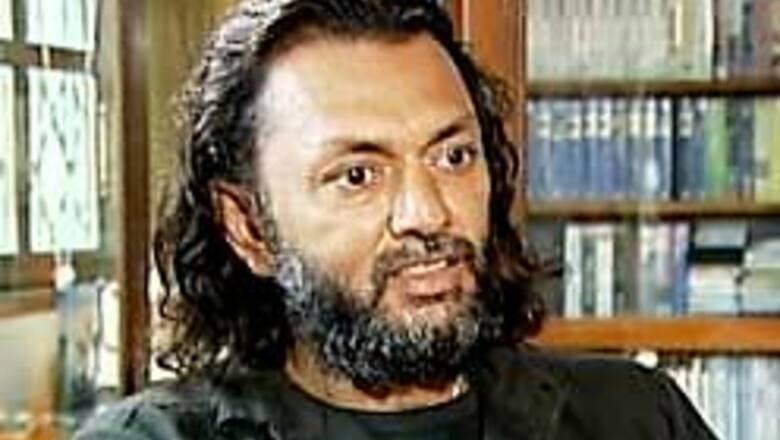
views
It's being called Rang De Basanti effect. A well-made film hotwired for urban youth, Rang de Basanti is one of the biggest hits so far, if producers are to be believed of the decade. The film's thunder was initially by its stars and now by real people. Today, let's meet the director, artist and filmmaker, Rakeysh Mehra.
Anuradha SenGupta: Rakeysh Mehra, the doctors have gone back to work but all of us have witnessed the anti-reservation protest over the last couple of weeks. Where do you think you are in that great debate? Does art imitate life or life imitate art?
Rakeysh Mehra: Definitely, art imitates life and there is no question about it. Whatever you do for art, in my case it is cinema, you borrow from life. It's again very entrained to see that once art has imitated life, life stars imitating arts.
Anuradha SenGupta: But what do you make of all those people who'd gone out there, who beat the media, beat even your co-producers? And Roni Screwala was quite happy with calling it the Rang De Basanti effect. Done that, haven't they?

Rakeysh Mehra: It's quite humbling to understand that people are calling it Rang De Basanti effect. I think it is too early to understand it and to analyse any thing. It's the media which is calling it that at the moment. And they have seen some similarity or they feel that the movie came at a time which served as a catalyst. It's thus given it a kind of a trigger mechanism.
Anuradha SenGupta: But you must be relieved that the end of your film didn't inspire people too much, isn't it?
Rakeysh Mehra: No, it did. I beg to defer that. The end of the film was that you take a stand and if you want to change anything, you have to change the person you stare in the mirror everyday in the morning. And that's the person you have to change. You change yourself. And gone are the times when you're kind of pointing to the establishment and sit on the fence and say, 'this is not happening, that is not happening'. So that's what the end of the film was about and I am very happy that people got it right. I was very scared that they might interpret the film wrongly.
Anuradha SenGupta: Lot of people have reacted to the film saying that they may have enjoyed parts of it but the conclusion that you may probably have to be violent to others and to yourself, is not the message they are comfortable with. How do you react to that reaction?
Rakeysh Mehra: Quite normally, I must say. It's not a politically correct film, if you are saying that. And my job is to tell stories; my job is not to be politically correct. And movies are anyway not about being politically correct.

Anuradha SenGupta: There are lots of people who consider the fact that the film might be propagating violent means to achieve a goal or to correct wrongs in the system. That is the philosophy and where do you stand on that, is what I want to know.
Rakeysh Mehra: I beg to differ because that is not the philosophy of the film. I have been touring the film all over the country, in fact, now all over the world. The film was shown in IIT, Chennai to seven and a half thousand students. They had invited us. And the response was quite huge. And believe me, Anuradha, not a single person till date has asked me where to get the license for my gun or where to buy my gun. All of them have turned around and said, 'You know what, you got a thinking somewhere deep down. It's a disturbing film in the way you told the story. And it moves us and now we want to do something'. And that's exactly what's happening when we talk about these protests on the streets and people going on emulating the film with candle marches. Everywhere, it is a very peaceful protest.
PAGE_BREAK
Anuradha SenGupta: Swades and Rang De Basanti, if you look at the plots and the stories, if you just look at one sentence about the film, it is about awakening your consciousness and dealing with what is around you?
Rakeysh Mehra: Absolutely, so was Gandhi and so was Naya Daur.
Anuradha SenGupta: Right now, when you compare Swades and Rang De Basanti, one captured popular imagination, the other didn't. Yours did because the end was extreme or radical?
Rakeysh Mehra: If you are comparing and you are saying that it's because of the radical nature, people have liked it more, I would beg to defer there because what Rang De was touching you on was something which is very contemporary. An emotion deep down something, which you are going through everyday. While, Swades was more generic in its approach. Swades had more of a classic 60's approach. Though I haven't spoke to Ashutosh about what his point of view was, every person has his own interpretation of his story. My daughter has a different interpretation of Rang De Basanti, and my mother has a different interpretation of it.

Anuradha SenGupta: You want to tell us what they are, the two different interpretations?
Rakeysh Mehra: My daughter loves the songs. She is seven years old. And she loves the action in the film. Seven-year-old minds can think like that. Whereas my mother thinks, 'You have done a good thing in your life and I am proud of you that. You have made a film for the country. You should not have killed the boys'. You see, she is 70 years old. So, there is a seven-year-old and a 70-year-old. So they will have their own thing out of the film.
Anuradha SenGupta: The Rang De Basanti cast and some members of the crew went to Delhi to support Medha Patkar's fast with the Narmada Bachao Andolon. What is your stand? Why did you go?
Rakeysh Mehra: To find out what's happening and Aamir had asked me to. One thing he told me was, 'Hey Rakeysh, what are you doing on 13th or 11th? I want to spend a whole day with you'. A couple of days later, I told him that I had postponed my trip. He said he was in Delhi and was passing by Jantar Mantar and that there was a crowd there.
Anuradha SenGupta: So you went because he asked you to go.
Rakeysh Mehra: Yes, he asked me.

Anuradha SenGupta: And so you spontaneously went with him.
Rakeysh Mehra: He asked me if I wanted to go or not. I said it sounded really interesting. We have been hearing this Narmada thing since I used to wear short pants in school and now I've grown old and have this white beard and it's still going on. So it sounds like a visit to me, so I thought I should go and find out what's happening.
Anuradha SenGupta: Did you feel the same kind of curiosity about the anti-quota protests that were happening? Because in a sense, it was perhaps more linked to the kind of the target group on whom you had made the film?
PAGE_BREAK
Rakeysh Mehra: In a sense, I was inspired by anti-quota protests daring the Mandal Commission. And I had witnessed that in Delhi. I was not a part of it because I had passed out, but all the younger brothers of my friends were there; they were getting beaten up. Prior to this, I had written a story on that called Aawaz, which I wanted to make into a film and which almost went to the floor but it didn't work out. I think a little bit of Aawaz remains in my system and a little bit of something else which kind of surfaced in Rang De.
Anuradha SenGupta: The anti-reservation protests that doctors and students across the country have launched, did you not want to spontaneously go and be a part of that or did your fingers burn after the experience of showing solidarity with the NBA?
Rakeysh Mehra: No, as a citizen of this country, if I get an opportunity to raise my voice against something which is not being heard, I will raise my voice. If at that point of time, there is a small voice inside me saying, 'Come on, go out and raise a voice against this'.

Anuradha SenGupta: Where do you stand on the reservation debate? Anti?
Rakeysh Mehra: As far as I am concerned, I think at the helm of it somewhere there is a vote bank happening. It is not an intention in its purest sense and sincerity. If I were to look at Mr Singh into his eyes, I am sure he will look away. Nobody can refuse that the backward classes have to come forward. And there has to be an abolition of the whole system, which has been going on since Manu Smriti.
Anuradha SenGupta: This move, are you saying is a calculated political move?
Rakeysh Mehra: Most of the time I think, even at the time of Mandal Commission, it was a calculated political move which is a kind of backlash stand. The Government has to fall.
Anuradha SenGupta: Do you absolutely aback by the backlash that your film saw and now subsequently Aamir's next film is seeing?
Rakeysh Mehra: No, I am not surprised, I don't expect much out of petty politics anyway, and you need a larger picture. So I am not surprised as such. You've seen it all, you have seen it right through, it's not about party politics. You saw it during Emergency.
Anuradha SenGupta: I think you have made this point in your film very very emphatically with Atul's character indeed.
Rakeysh Mehra: It was more a point on human nature. The changeover in Atul and his ideology. His ideology remains the same. But the blinkers he was wearing, kind of falls apart.

Anuradha SenGupta: You have just come back from the Cannes Film Festival. You seem like perhaps the few people who actually saw films there. How many did you see?
Rakeysh Mehra: Not many, in fact. I had stayed there for three days in all. I saw all of four to five films.
Anuradha SenGupta: You got left an impression?
Rakeysh Mehra: The movie called Volver.
PAGE_BREAK
Anuradha SenGupta: Tell me if you had a choice between being the most successful director, producer in India, like Yash Chopra, or to be someone like Aliandro, Inerito or Fernando Miarrals, the Brazilian, Mexican directors, who have made the mainstream big budget films but are really unknown for the work they did before, which could you chose?
Rakeysh Mehra: I'll choose a Chetan Anand or a Guru Dutt.
Anuradha SenGupta: Pyasaa is a favourite film, is not it?
Rakeysh Mehra: One of the favourites.

Anuradha SenGupta: If you have to make top three, would it be number one?
Rakeysh Mehra: Somewhere there. I think it is the most romantic story ever been told; yet it has its own kind of victory. It has got a different kind of hero. And this is very difficult to achieve. So it sounds more like a fable. Today, you become a hero not by confronting but by escaping. And it is very unique.
Anuradha SenGupta: Very romantic, isn't it?
Rakeysh Mehra: Extremely romantic. It's romancing yourself. As a reader of a story or as a story teller, it is an ultimate story to tell.
Anuradha SenGupta: In Rang De Basanti, you talked about system, the political system around us or the society around us. In the film industry, isn't there a system that really needs to be shaken up? Because we see film makers and producers and stars talking about releasing glossy films every quarter or once a month and glossier publicity campaigns and you know there is a conspiracy of silence about people walking in the film industry, who sometimes do not get paid. And there are no contracts and this is not withstanding with the corporatisation?
Rakeysh Mehra: I can see for sure, not in the movies I make. It's not an arrogant statement, but I can't work like that.
Anuradha SenGupta: It happens, isn't it, and a lot?
Rakeysh Mehra: Not now, it's changing.

Anuradha SenGupta: When I talk to professionals who have not yet arrived, who have yet not become successful individuals, they say they are taken for a ride more often than not. What one needs to understand that being taken for a tide is like right for passages if you belong to the industry.
Rakeysh Mehra: No, no, no, it's not really like that, I don't think so.
Anuradha SenGupta: Come on, you worked as an assistant director very briefly, very long back, isn't it?
Rakeysh Mehra: For two weeks.
Anuradha SenGupta: Exactly, you couldn't stick it out?
Rakeysh Mehra: Not as an assistant director, as a tea boy. Not even a tea boy, even the tea boy used to shout at me.
PAGE_BREAK
Anuradha SenGupta: Even more difficult, you know. And I am talking about cinematographers, editors, and people with stories like this; people with little more education than the tea boy.
Rakeysh Mehra: I will tell you what. It's a question of your self-esteem and your self-respect. If you think you have not been treated well, don't do it. I will rather starve, let my family starve rather than be shamefully treated somewhere else. So I have no issues in that, it is a very individual thing. I know of individuals, I can name you so many of them, who took a stand and today they are the most respected technicians in the industry, who said, 'No, I am not going to succumb to it. Big deal, I am not going to shoot your film. I am a cameraman, pay me my price, pay me my installments, otherwise I am not coming tomorrow morning'.

Anuradha SenGupta: You have been in public eye a lot after Rang De Basanti. You were in public eye a lot when you signed Amitabh Bachchan and you started on Aks and the BPL commercials before that. What do you believe in? Cinema?
Rakeysh Mehra: I love cinema, it's like the atmosphere I have to breath in. It is like oxygen so it's essence to your existence.
Anuradha SenGupta: Yet you sold Eureka Forbs vacuum cleaners when starting out?
Rakeysh Mehra: Had to. You have to survive; you have to earn money.
Anuradha SenGupta: Was there the passion for cinema even then?
Rakeysh Mehra: No, actually I won't say that I always wanted to make movies, I really didn't know that I wanted to make movies. That I love movies, I can tell you for sure.
Anuradha SenGupta: Lot of people know about you as a successful filmmaker, as a very successful ad film maker. Is it easy to forget about the days indeed, and there have been hard days?
Rakeysh Mehra: I don't know how to define hard days. Is hard days when you don't have the money or you don't have a house?
Anuradha SenGupta: I don't know, what would have been hard days for you? That's what I want to know.
Rakeysh Mehra: Nothing. I think there is nothing called easy and difficult, it's a process, you either enjoy it or you don't enjoy it. So, fortunately, I have enjoyed every bit of it, because that is what life is all about. While Rang De Basanti is an authentic film, it is very successful today and has got it's own trauma, got it's own price, we pay for that.

Anuradha SenGupta: Tell us a bit of that.
Rakeysh Mehra: You have to with every film you make, you have to get a part of yourself. A kind of it consumes you. And that part you can never get back. It's like the losing of your virginity. It's like motherhood, it's like losing the shape of your body with the joys of your motherhood.
Anuradha SenGupta: That's what film making is like to you?
Rakeysh Mehra: To me it comes, that is the closest I can see.
PAGE_BREAK
Anuradha SenGupta: Would your family at that point take a back seat? Does it happen? When you get so involved with the project?
Rakeysh Mehra: Family suffers, yes. No question about that. My daughter is seven and my son is four. I don't know where three to four and six to seven went. I have missed two years of my daughter's growing up. And I missed my son's two to four. That's ok, I guess, that's the price.
Anuradha SenGupta: I read somewhere you said that your parents ensured that you are fed and educated in a manner way beyond their means. Tell me about your parents.
Rakeysh Mehra: Doesn't each and every parent do that? Thus very little to say, you can't put it in words I guess, it's a feeling. And how to describe feelings?

Anuradha SenGupta: Did your father work in The Claridges?
Rakeysh Mehra: Oh, yes he did for a good 35 years.
Anuradha SenGupta: Tell us about that, and he has some film appearance or something?
Rakeysh Mehra: Never, ever. He loved movies and the old man is no more now. He was the one who initiated me into cinema. And he was an encyclopedia on movies in the sense he knew everything about technicians and who is the guy in the crowd and the character artists. Forget about the lead artist and the story writer. And he told me what was right in the story and what was wrong. And it was a very one-sided discussion because I had no point of view. And then I remember us getting a record player and the first LP was the sound track of Mughal-e-azam. And he used to hear it every night.
Anuradha SenGupta: Given his views on cinema, his interests, what do you think he would have rated Rang De Basanti?
Rakeysh Mehra: I know him well. If he had seen Rang De Basanti, he would have told me about Aawara or he would have told me about Mother India and said, 'You know what, ok, well tried, but I'll tell you about a good story. I think you have tried a bit too hard'.
Anuradha SenGupta: You know, you are one of the few people in India who made the transition from being an ad filmmaker to a filmmaker. Is not it a different mindset actually between the two?
Rakeysh Mehra: Advertising is like you pretty much know what you are doing, in the sense you are working under the umbrella of marketing. And you are selling something, which is very tangible. Technically, you are always a forerunner there compared to any other disc play man in the audio-visual world. Compared to movie making, advertising is always a couple of steps ahead today, because it's got too much money to get too little of communication. I have just finished the launch of commercials for Reliance with Mr Bachchan and it was great to shoot with him.
Anuradha SenGupta: What is this thing with Mr Bachchan, he is the man who got the trust easily?
PAGE_BREAK
Rakeysh Mehra: I guess I love him too much. It is a bonding, what can I do?
Anuradha SenGupta: You want to say he is like marijuana, is he indeed?
Rakeysh Mehra: Ya, once you get hooked to him, you get addicted. My respect for him is my admiration, my love for him as a human being. I have seen him closely and I admire him as a great human being first.
Anuradha SenGupta: You said that very emphatically and not as an actor yet?
Rakeysh Mehra: That he is the best actor in the world is secondary, but first and foremost he is a great human being. And that's what attracts not only me, but millions of people towards him.
Anuradha SenGupta: Ok, you know you are going to move on to making Delhi Six or Dilli Six, how does it say?
Rakeysh Mehra: Dilli Chhey.
Anuradha SenGupta: Yeah, Dilli Chhey. I tried to get to know a little bit about you, I believe Dilli Chhey is inspired by, in bits and pieces perhaps, by your childhood in Delhi?
Rakeysh Mehra: No, it is not autobiographical. It is absolutely wrongly quoted as of now.
Anuradha SenGupta: But your context, your growing up years, something?
Rakeysh Mehra: I know the area. Our nana-nani and dada-dadi both had their houses in Old Delhi. And that's where as a child I spent my childhood. So, I have very fond memories.
Anuradha SenGupta: So, you used the context?
Rakeysh Mehra: I am using the environment, I am using the experience and again you know the circle is round and you come back where you started. I can only draw from what I know, what my imaginations have been and what my experiences have been.
Anuradha SenGupta: Rakeysh Mehra, is it better being Rakeysh Mehra today, post Rang De Basanti compared to post Aks?
Rakeysh Mehra: Yes, definitely, sincerely and honestly, no questions about that. What it means for me is that now I will be able to tell my story the way I want to, a little more freely. See in Aks, I told the story the way I wanted to. And then it took me six years to tell my story again. There is definitely more learning.

Anuradha SenGupta: You were an ad filmmaker coming into films with Aks. Is content equal to, if not more important, than form?
Rakeysh Mehra: That's interesting as an observation. Yes, after Aks what I realise is I get along with actors, that direction comes naturally to me, in the sense, I don't have to direct them. The last thing you have to do in direction is to direct. Because the actors really know what they have to do and a music director really know what he has to do.
Anuradha SenGupta: So what is your strength? Getting the right people to get the right thing? The passion, what is it? Or knowing how to put it together?
PAGE_BREAK
Rakeysh Mehra: I don't know my stance yet, because I am just two films old. But what I have learnt is what really rules is the story that you are telling. What really will stay forever is the film in totality. What do you really listen to is the small voice inside you, which is your instinct. Which makes all the difference.

Anuradha SenGupta: Even when you had the first set of producers who didn't put money to sell property and to borrow at usurious rates from market?
Rakeysh Mehra: Properties are meant to be sold or bought.
Anuradha SenGupta: But you followed your instinct, then is not it?
Rakeysh Mehra: Yes, you have one life, you have to follow your own voice, I guess there is no other way of doing it.
Anuradha SenGupta: Follow your voice, Rakeysh Mehra. Thank you very much for being on Being.
Rakeysh Mehra: Thanks for having me over.












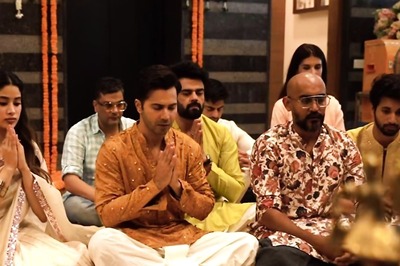
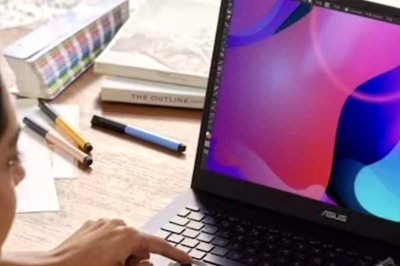

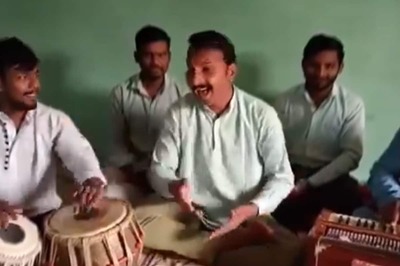
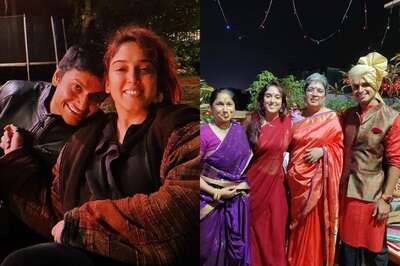
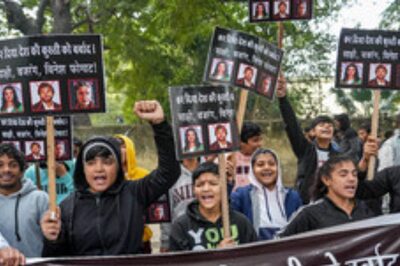
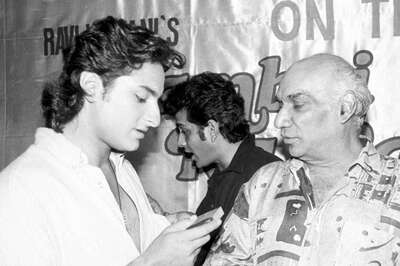

Comments
0 comment